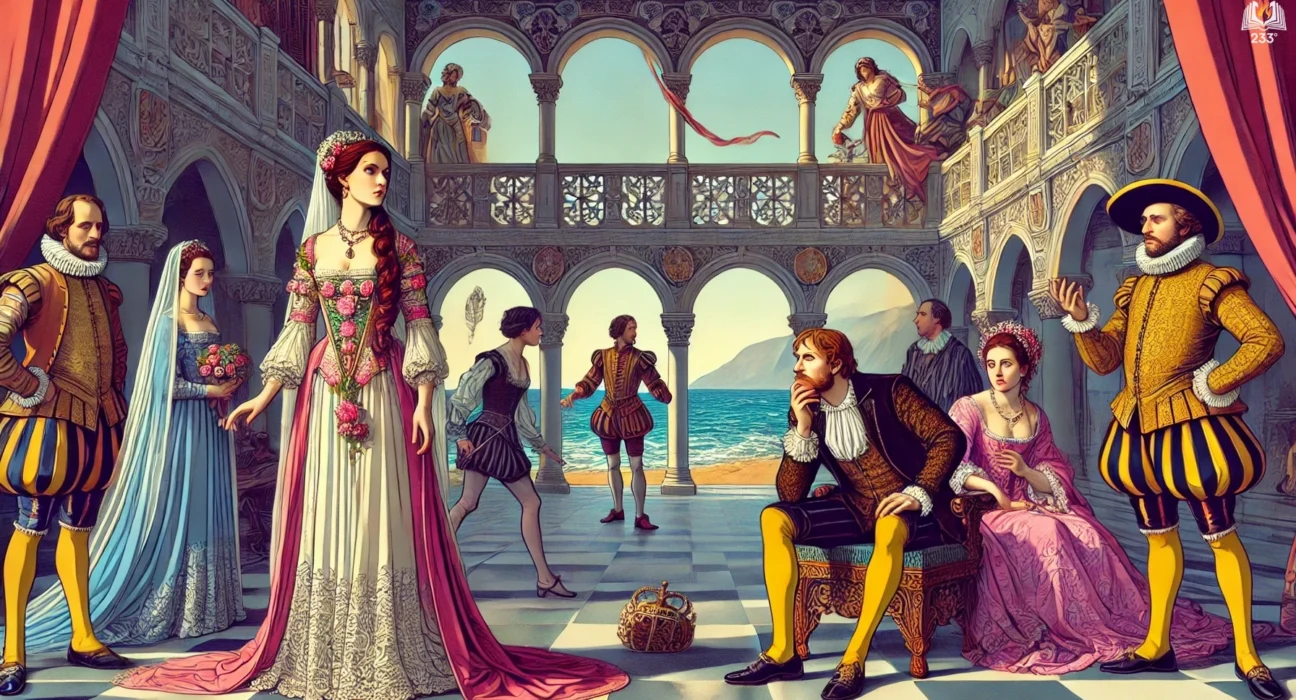“Twelfth Night” is a comedy play by William Shakespeare, written around 1601-1602. The play centers around themes of love, mistaken identity, and the joy and pain it brings. Set in the fictional land of Illyria, the narrative unfolds through a series of comedic events involving shipwrecks, love triangles, and clever disguises.
Plot Summary
In the coastal land of Illyria, the sea is a tempestuous force, scattering its waves with fury. Amidst this chaos, a ship breaks apart, casting its passengers into the depths. Viola, one of the passengers, clings to a piece of the wreckage, her heart heavy with the fear that her twin brother, Sebastian, has been claimed by the sea. Washed ashore, she finds herself in a strange land and is soon aided by a kind captain. Learning that she is in Illyria, a realm ruled by the noble Duke Orsino, she devises a plan to survive in this unfamiliar place. Disguising herself as a young man named Cesario, she seeks employment in Orsino’s court, her intentions masked beneath a veil of uncertainty and hope.
Duke Orsino is a man ensnared by his own passions, deeply in love with the noble Lady Olivia. His affections, however, are met with resistance. Olivia, mourning the recent deaths of her father and brother, has vowed to shun the company of men for seven years. Undeterred, Orsino sends emissaries to woo her on his behalf, but each attempt is rebuffed. Viola, now Cesario, finds herself in Orsino’s service, tasked with the delicate mission of conveying his love to Olivia. Yet, as she spends time with the Duke, her own heart betrays her, for she begins to fall for Orsino herself.
Viola, as Cesario, visits Olivia’s household. With a face concealed by a veil of mourning, Olivia listens to Cesario’s eloquent proclamations of Orsino’s love. But the words that Cesario speaks, filled with sincerity and emotion, stir something unexpected in Olivia. Though she has sworn off love, she finds herself captivated by the young messenger. As Cesario departs, Olivia’s heart is left in turmoil, and she quickly devises a plan to see him again, sending a ring after him under the pretense that he left it behind. Viola, receiving the ring, is thrown into confusion, realizing that Olivia has fallen for Cesario—her male disguise.
Meanwhile, in Olivia’s household, merriment and mischief brew. Sir Toby Belch, Olivia’s rowdy and drunken uncle, finds joy in the company of the foolish Sir Andrew Aguecheek, who is infatuated with Olivia. Their late-night revels disturb the steward, Malvolio, a man of puritanical disposition. Maria, Olivia’s clever maid, hatches a scheme to humble the arrogant Malvolio. She forges a letter in Olivia’s handwriting, planting it where Malvolio will find it. The letter suggests that Olivia is in love with him and desires to see him in yellow stockings and cross-gartered, a sight she supposedly adores.
Malvolio, discovering the letter, is ecstatic. His vanity blinds him to the absurdity of the request, and he dons the garish attire, preparing to present himself to Olivia. He approaches her with smiles and cryptic references to the letter’s contents, but Olivia is bewildered by his behavior, unaware of the prank. She instructs others to care for him, believing he has lost his wits, while Sir Toby, Maria, and their cohorts enjoy the spectacle of Malvolio’s self-delusion.
As this comedy of errors unfolds, another shipwreck survivor arrives in Illyria—Sebastian, Viola’s twin brother, who was thought to be lost to the sea. He is accompanied by Antonio, a sea captain who saved him. Antonio is devoted to Sebastian, risking his own safety to stay near him despite being an enemy to Orsino’s court. Unbeknownst to all, Sebastian’s resemblance to Viola, who is disguised as Cesario, will soon lead to even greater confusion.
Olivia, still enamored with Cesario, encounters Sebastian, believing him to be the young man she has grown infatuated with. Mistaking him for Cesario, she proposes marriage in a rush of emotion. Sebastian, bewildered by her sudden affection but struck by her beauty and nobility, agrees. They are quickly wed in a secret ceremony, a union born from mistaken identity and passionate impulse.
In the meantime, Orsino and Cesario arrive at Olivia’s estate. Orsino, still unaware of Cesario’s true identity and intentions, is disheartened by Olivia’s lack of reciprocation. When Olivia greets Cesario as her husband, Orsino is incensed, believing Cesario to have betrayed him. Viola is caught in a web of her own making, struggling to maintain her disguise and manage the growing chaos around her.
The situation reaches its peak when Antonio intervenes, mistaking Viola for Sebastian and accusing her of betrayal. The appearance of the real Sebastian unravels the confusion, as the twins are finally reunited in a moment of astonishment and joy. The truth of Viola’s identity is revealed, and with it, the love she harbors for Orsino. Struck by her loyalty and moved by her confession, Orsino proposes to Viola, seeing in her the constancy he had longed for.
Malvolio, the victim of Maria’s prank, emerges from his ordeal humiliated and vowing revenge on those who mocked him. The play, however, ends on a note of reconciliation and celebration. Olivia and Sebastian, Orsino and Viola—these pairs find happiness in the unexpected turns of their lives. The merrymakers reflect on their deeds, with Sir Toby and Maria having wed as well.
Amidst the laughter and the joyous unions, the play closes with a reminder of the thin line between comedy and tragedy, between love and folly. In Illyria, where identities blur and love knows no bounds, the characters find themselves changed by the experiences of mistaken identities and the whims of the heart. And so, they step forward into the future, hand in hand, their hearts now aligned in the harmony of true affection.
Main Characters
- Viola: Shipwrecked on the coast of Illyria, she disguises herself as a young man named Cesario to work for Duke Orsino. Viola is resourceful, intelligent, and embodies the theme of unrequited love as she falls for Orsino while serving him.
- Duke Orsino: The Duke of Illyria, hopelessly in love with Lady Olivia. He is passionate and self-indulgent in his love, often seen as being in love with the idea of love itself.
- Olivia: A noblewoman mourning her brother’s death, she swears off love but finds herself attracted to Cesario (Viola in disguise). Olivia is strong-willed, independent, and embodies the chaos of misplaced affection.
- Sebastian: Viola’s twin brother, presumed dead in the shipwreck. His appearance later in the play leads to a case of mistaken identity, causing a comedic stir.
- Malvolio: Olivia’s steward, a self-righteous and puritanical man. He becomes the target of a prank that leads him to believe Olivia loves him, highlighting themes of ambition and self-deception.
- Sir Toby Belch: Olivia’s uncle, a jolly drunkard who enjoys merriment and schemes, including tricking Malvolio. He represents the play’s indulgence in revelry and excess.
- Maria: Olivia’s clever and mischievous maid. She masterminds the prank on Malvolio, showing a sharp wit and resourcefulness.
Theme
- Love and Desire: The play explores various forms of love, including unrequited love (Viola for Orsino, Orsino for Olivia), self-love (Malvolio), and true love. It depicts love as something that can cause both joy and pain, often leading to irrational behavior.
- Mistaken Identity and Disguise: Disguise and mistaken identity drive much of the play’s comedy. Viola’s disguise as Cesario causes confusion and comic misunderstandings, questioning the nature of identity and gender.
- Folly and Foolishness: Characters like Malvolio and Sir Andrew Aguecheek represent different aspects of folly. The play highlights human foolishness and the ridiculous nature of social ambition and self-deception.
- The Joy and Pain of Love: Shakespeare presents love as an emotion that can be both delightful and excruciating. The characters experience the highs of affection and the lows of unreturned love, showing love’s complex nature.
Writing Style and Tone
Shakespeare’s writing style in “Twelfth Night” is characterized by its witty dialogue, clever wordplay, and poetic expressions. The play utilizes blank verse and prose, allowing characters to express themselves in both formal and informal speech. The language is rich with metaphors and puns, contributing to the comedic and romantic elements of the narrative.
The tone of the play is light-hearted and humorous, with an undercurrent of melancholy, especially in the themes of unrequited love and the fluid nature of identity. While the play is comedic, there is a deeper examination of human emotions and the complexities of love and desire. Shakespeare creates a balance between mirth and introspection, engaging the audience in both the laughter and the more serious reflections on love and identity.
We hope this summary has sparked your interest and would appreciate you following Celsius 233 on social media:
There’s a treasure trove of other fascinating book summaries waiting for you. Check out our collection of stories that inspire, thrill, and provoke thought, just like this one by checking out the Book Shelf or the Library
Remember, while our summaries capture the essence, they can never replace the full experience of reading the book. If this summary intrigued you, consider diving into the complete story – buy the book and immerse yourself in the author’s original work.
If you want to request a book summary, click here.
When Saurabh is not working/watching football/reading books/traveling, you can reach him via Twitter/X, LinkedIn, or Threads
Restart reading!








